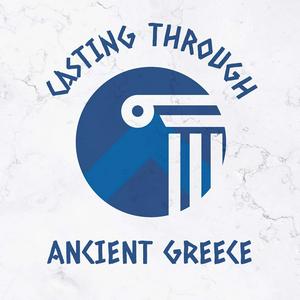131 episodi

Teaser: The Strategic Vacuum (Patreon)
05/12/2025 | 6 min
Victory didn’t end the story; it changed the rules. After Mycale and Plataea, the Persian threat receded, the Aegean opened, and a vacuum pulled Athens, Sparta, and Persia into a new contest—one fought with fleets, diplomacy, and competing visions of security. We walk through the decade that followed 479 BC to show how shattered empires, cautious land powers, and ambitious sea powers redrew the map of Greek politics.We unpack Persia’s strategic shift from invasion to consolidation: naval losses that invited Ionian revolts, satraps scrambling to stabilize Lydia and the Hellespont, and a measured pivot to subsidies and envoys that exploited Greek divisions. On the mainland, we contrast Sparta’s deliberate restraint—defending the Peloponnese, avoiding distant obligations, and prioritizing social stability—with Athens’ awakening to maritime destiny. The Athenian fleet becomes more than defense; it becomes identity, food security, and leverage, soon anchored by the Piraeus and the Long Walls.At the heart of the story sits the Ionian question: who protects the liberated cities when Persian garrisons fall away? Athens answers with ships and treaties that coalesce into the Delian League—a standing alliance promising collective security while granting Athens command of contributions and strategy. We explore how the League funds naval expansion, extends operations to Cyprus and the Hellespont, and slowly turns cooperation into hegemony. Along the way, we track the emerging fault line with Sparta, as allied poleis navigate between land hegemony and sea hegemony, and Persia watches for fractures to widen.By the end, freedom has returned to the Aegean, but unity has not. That paradox—liberation without consensus—sets the foundations for the classical Greek order, Athenian naval supremacy, and the rivalries that will define the fifth century. If power abhors a vacuum, this decade shows who rushed in, why they moved, and how their choices reshaped the world. Subscribe, share, and tell us: which decision mattered most—the Spartan retreat, the Athenian fleet, or Persia’s long game?Support the show💬 Stay Connected with Casting Through Ancient GreeceFollow us for updates, discussions, and more ancient Greek content:🌐 Website📸 Instagram🐦 Twitter📘 Facebook 🎙️ Love the show? Don’t forget to subscribe, leave a review, and share it with fellow history enthusiasts. Your support helps keep the stories of ancient Greece alive!

99: The Arrival in Sicily
28/11/2025 | 40 min
Bronze flashed on the water and songs filled the air as our fleet left the Piraeus, but the shine faded fast along the Italian coast. Harbors opened while hearts stayed closed, Segesta’s “treasure” dissolved into borrowed plate, and our grand design was forced to contend with supply lists, neutral cities, and the creeping cost of time. We lay out how awe met caution in Magna Graecia, why admiration didn’t translate into alliances, and how an expedition sold on momentum stalled before the straits.Inside the armada, strategy split three ways. Alcibiades treated diplomacy as the first battlefield, Lamachus argued for a decisive strike, and Nicias warned that every day ashore drained our strength. Then Athens called Alcibiades home to face charges, and he slipped into exile—taking with him both political cover and a unifying vision. Meanwhile, Syracuse moved from rumor to readiness. Hermocrates urged a coalition and preemption; Athenagoras dismissed invasion talk and accused rivals of stoking panic. A measured course prevailed: arm, scout, and prepare. We follow that shift, the quiet coup that delivered Catana, and the dispiriting tour that yielded little more than thirty talents.The turn comes with a ruse. Nicias baited the Syracusans into marching north as our ships slid south to the Olympion. The battle that followed was tight and testing: veteran cohesion against raw numbers, archers and peltasts picking seams, cavalry blunted by terrain and haste, and a sudden storm breaking nerves. We won the field and raised a trophy, but not the decisive victory that ends a war. From there, the real stakes emerge—where to plant a permanent base, how to choke Syracuse without cavalry, and how to keep a divided command aligned as the city behind us grows impatient.Sail with us through shifting alliances, political gambits, and battlefield deception as the Sicilian Expedition moves from pageantry to peril. If this story gripped you, follow the show, share it with a friend who loves ancient history, and leave a review with the moment you found most surprising. Support the show💬 Stay Connected with Casting Through Ancient GreeceFollow us for updates, discussions, and more ancient Greek content:🌐 Website📸 Instagram🐦 Twitter📘 Facebook 🎙️ Love the show? Don’t forget to subscribe, leave a review, and share it with fellow history enthusiasts. Your support helps keep the stories of ancient Greece alive!

Teaser: Legacy of Victory (Patreon)
11/11/2025 | 5 min
A continent-spanning empire bore down on a patchwork of rival city-states—and out of that pressure, a people discovered themselves. We follow the Greek victories over Persia from raw survival to a moral origin story, showing how memory, art, and ritual transformed urgent alliance into a lasting idea: Hellenic freedom.We start with the fragile coalition that met the Persian advance at Salamis and Plataea, then uncover how the meaning of those battles grew in the retelling. Simonides’ epigrams, Pindar’s odes, and Herodotus’ sweeping narrative forged a panhellenic lens through which courage, divine favor, and self-rule became the Greek signature. Monuments like the Serpent Column at Delphi and offerings at Olympia turned sanctuaries into archives of unity, while annual rites at Plataea and Salamis taught that freedom must be renewed, not assumed.Athens made the memory visible. Rising from a burned Acropolis, the city reframed myth as politics on the Parthenon, casting Greeks versus Amazons and gods versus giants as a code for order resisting tyranny. At the same time, naval power rewired society. Themistocles’ triremes elevated the rowers—the thetes—and widened democratic voice, seeding the Delian League and a new maritime identity. That shift sharpened the contrast with Sparta’s land-first conservatism, foreshadowing rivalry even as the ideal of Hellenic liberty took root.We connect these threads to later thinkers and leaders. Thucydides uses the Persian War as a baseline of necessary unity. Plato and Isocrates hold it up as a mirror for civic virtue. Alexander taps its emotion to justify conquest. Across centuries, the wars became sacred history and a durable myth: free citizens against imperial despotism, reason over hubris. Listen for a richer view of how battles end but stories begin—and how those stories still guide debates on power, identity, and the price of freedom. If this sparked new questions or changed your view, subscribe, share, and leave a review with the one idea you’ll remember most.Support the show💬 Stay Connected with Casting Through Ancient GreeceFollow us for updates, discussions, and more ancient Greek content:🌐 Website📸 Instagram🐦 Twitter📘 Facebook 🎙️ Love the show? Don’t forget to subscribe, leave a review, and share it with fellow history enthusiasts. Your support helps keep the stories of ancient Greece alive!

98: Launch of the Sicilian Expedition
03/11/2025 | 40 min
Trumpets sounded over the Piraeus and a city’s confidence took shape in bronze and oars. We follow the launch of the Sicilian Expedition from the charged votes in the Assembly to the glittering departure ritual that Thucydides captures with chilling clarity, tracing how a cautious proposal spiraled into the most costly armament a single Greek city had ever sent to sea. Along the way, the story exposes the fragile scaffolding beneath the spectacle: stretched finances, untested logistics, and a leadership trio whose visions for victory did not neatly align.We unpack why Nicias’s warning inadvertently enlarged the mission, how private wealth and public funds turned ships into floating symbols of prestige, and what it really took to feed, water, and coordinate 134 triremes and thousands of troops far from home. The mood in Athens—joy, pride, and hunger for pay and glory—meets a jolt of fear when the Herms are mutilated. That sacrilege, and accusations of mocking the Eleusinian Mysteries, recast the expedition as a test of piety as much as power. Alcibiades demands an immediate trial to clear his name; conservatives stall, aiming to blunt his momentum. He sails under suspicion as informers multiply and recall whispers gather force.At sea, strategy tightens into choices. Lamachus urges a quick strike on Syracuse; Nicias wants patience and proof; Alcibiades argues for encirclement through alliances. The route through Corcyra and the heel of Italy doubles as diplomacy, but support proves thin. Regium offers only its harbor; Segesta’s promised silver dissolves into theater. The expedition’s grand math starts to wobble, and the Athenians confront the hard truth that empire projected across the Ionian is measured in barrels and treaties, not just in votes and bravado.If you value deep dives into ancient strategy, politics, religion, and the human psychology behind big decisions, tap follow, share this episode with a history-loving friend, and leave a review telling us which strategy—direct strike, slow build, or alliance-first—you would have chosen. Support the show💬 Stay Connected with Casting Through Ancient GreeceFollow us for updates, discussions, and more ancient Greek content:🌐 Website📸 Instagram🐦 Twitter📘 Facebook 🎙️ Love the show? Don’t forget to subscribe, leave a review, and share it with fellow history enthusiasts. Your support helps keep the stories of ancient Greece alive!

Teaser: Mycale in the Wider War (Patroen)
22/10/2025 | 6 min
Empires can lose in stages—and the moments in between can matter most. We dive into the chain that turned Xerxes’ massive gamble into Greek momentum: the trap at Salamis, the phalanx at Plataea, and the “forgotten victory” at Mycale that shifted the war from survival to liberation. Step by step, a divided world of city-states learned to think as one, using geography, coalition discipline, and psychological pressure to unmake Persian dominance of the Aegean.We start with the strategic stakes of 480–479 BCE, when Athens and Sparta put rivalry on hold to exploit narrow seas and favourable ground. Salamis shows how triremes, tight channels, and local knowledge shattered a larger fleet and denied Persia the supply lines that kept its army viable. Plataea follows with a land reckoning: Pausanias’ coalition absorbed missile fire, closed ranks, and broke Mardonius’ force, clearing central Greece and puncturing the myth of Persian inevitability.Then comes Mycale on the Ionian coast, where the meaning of victory changes. Persian ships beached, Ionian units peeled away, and Greek hoplites stormed fortified positions—liberating cities that had long lived under satrapal rule. Near-simultaneous success at Plataea and Mycale delivered a morale shock the Persians couldn’t absorb and gave the Greeks ports, partners, and purpose. The result: a transition from defence to projection, the seeds of the Delian League, and a lasting story about unity, freedom, and the power of coordinated land–sea strategy.Support the show💬 Stay Connected with Casting Through Ancient GreeceFollow us for updates, discussions, and more ancient Greek content:🌐 Website📸 Instagram🐦 Twitter📘 Facebook 🎙️ Love the show? Don’t forget to subscribe, leave a review, and share it with fellow history enthusiasts. Your support helps keep the stories of ancient Greece alive!
Altri podcast di Scolastico
Podcast di tendenza in Scolastico
Su Casting Through Ancient Greece
Ascolta Casting Through Ancient Greece, English Break e molti altri podcast da tutto il mondo con l’applicazione di radio.it

Scarica l'app gratuita radio.it
- Salva le radio e i podcast favoriti
- Streaming via Wi-Fi o Bluetooth
- Supporta Carplay & Android Auto
- Molte altre funzioni dell'app
Scarica l'app gratuita radio.it
- Salva le radio e i podcast favoriti
- Streaming via Wi-Fi o Bluetooth
- Supporta Carplay & Android Auto
- Molte altre funzioni dell'app


Casting Through Ancient Greece
scarica l'app,
ascolta.


































